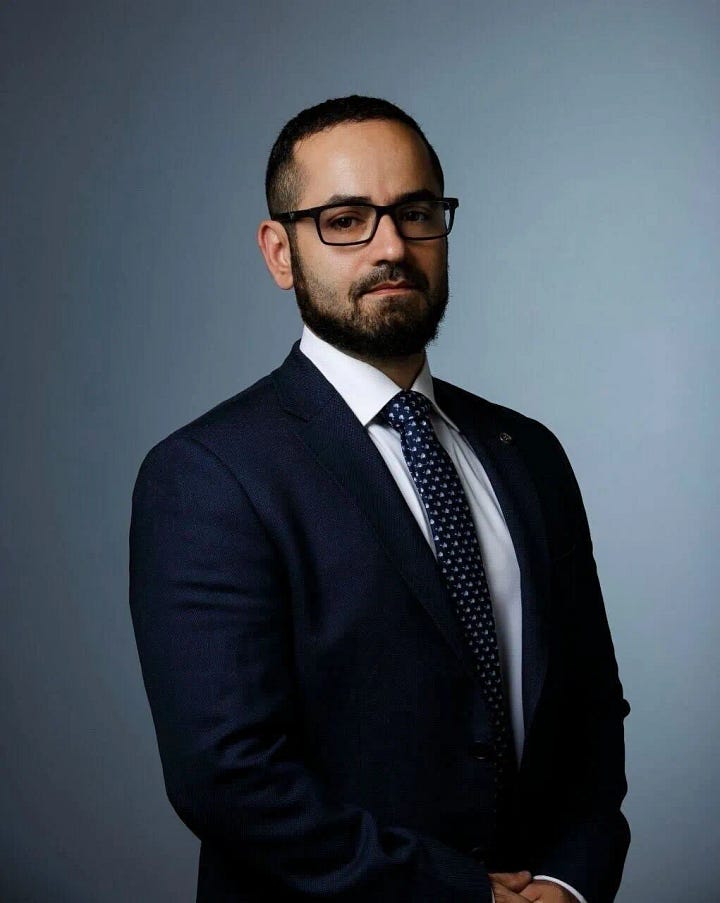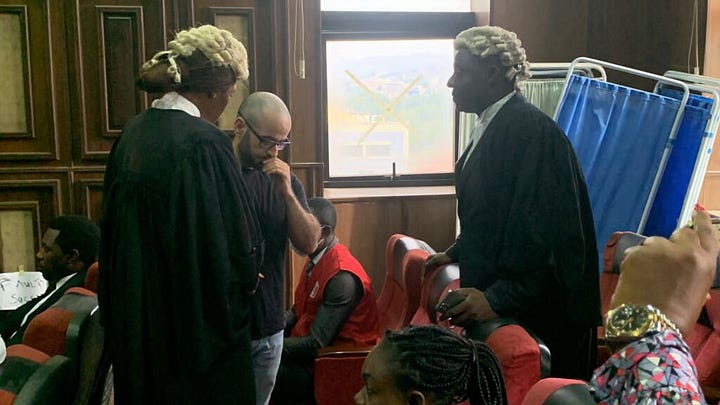Nigeria's Unnecessary Binance Mistake
Or The Gambaryan Gamble
Edition No #2 of The Relevant Information
Topic: Nigeria’s Binance Mistake or The Gambaryan Gamble
I hope y’all had a great weekend and got in some rest for this week’s activities. Today’s edition of The Relevant Information shares my thoughts on the Nigeria vs Binance saga, specifically the eight months imprisonment of Tigran Gambaryan and possible implications for the country.
If you enjoy reading the The Relevant Information, please invite your friends to subscribe
When midlevel Binance executives, Tigran Gambaryan and Nadeem Anjarwalla landed in Nigeria in February 2024, they had no inkling that rather than the compliance related exchanges they were promised would be held with Nigerian regulators, their visit was about to be a detention saga.
But detention it was to be, as security services quickly detained the men and transferred them from their hotel rooms, to a guest house supposedly belonging to the Office of the National Security Adviser(ONSA). A court order was soon obtained to hold both men in their personal capacity as crimes supposedly committed by Binance were investigated and charges prepared.
To cut a very long story short, in March, Nadeem Anjarwalla, who holds Kenyan, British and Pakistani citizenship, like a proper African/South Asian, allegedly bribed his way into an escape out of ONSA’s custody in an episode that would make the writers of Prison Break fall over in laughter. This triggered the Nigerian government into moving Mr Gambaryan into Kuje Prison and charging him personally to court for alleged crimes Binance supposedly carried out.
And now in October, the Nigerian government dropped all charges against Mr Gambaryan, after pressure from s high up as the US Secretary of State, Congress and the Director of the FBI. The poor ex-US Internal Revenue Service investigator has been medically evacuated from Nigeria, and we can now call an end to this saga, or so we wish.
From where I sit, I believe that unless Mr Gambaryan is a firm believer in the doctrine of turning the other cheek, this story is far from over. He was arrested and detained over crimes that it would be hard to argue in any sane jurisdiction he bore personal responsibility for, after he had arrived in Abuja in good faith to engage with Nigerian regulators on how Binance could better comply with local regulations.
He was remanded to a prison, and detained in conditions that anyone who knows what a Nigerian prison is like, would be hard-pressed to defend as not inhumane, cruel and unusual punishment.
Oh and he contracted malaria and pneumonia while in prison. Malaria for us Nigerians might not seem like the biggest deal, but if you have ever seen a Westerner from a clime unaccustomed to being ravaged by malaria, go through it, you would would pity Mr Gambaryan. His wife and others claimed he had developed mobility issues from a herniated disk.


Why do I point out these facts? Well, Gambaryan is an American and US courts have recently been very open to allowing civil suits by Americans and foreigners alike against foreign states, go forward, and in that regard the entire saga with Mr Gambaryan leaves us exposed.
Our only saving grace, might be that the US State Department held off on designating him wrongfully detained, with the implications in US law and policy framework as that would carry, as was demanded by several members of Congress.
Should Mr Gambaryan not be inclined to the doctrine of forgive and forget, we might end up in another PI&D/ type mess of a situation before foreign courts, or end up probably coughing up millions of dollars in settling judgements against us, as was recently ordered in the case of Louis Emovbira Williams.
If Gambaryan is vindictive enough to seek to punish us via US courts for his arrest and imprisonment over Binance’s alleged crimes, we would have no one but our government’s 'anyhowness' to blame.
Let me go all in and say that the way this administration has handled Binance has been completely unnecessary, and counterproductive to the greater good. Although it may have served the narrow minded interests of a few.
The first thing to understand is that the entire premise of Binance being used by currency speculators to manipulate the Naira’s exchange rates, is complete hogwash. Trading on Binance is not responsible for failed government policies, or the inability of an administration to tackle our fundamental economic challenges.
Now if you want to really understand how nonsensical that entire premise is, unless you were born yesterday (which hopefully you weren’t), you will recall that prior to Binance being founded in 2017, Nigeria had suffered a crushing foreign exchange crisis from 2015 right into 2017 when the naira stabilised at around N360 to a dollar.
We managed to hold the naira at that level until Covid delivered us back-to-reality slap, by burning through dollars earned from crude oil exports (of course we export nothing else of signifcant value) to fight the market. We did not correct our economic fundamentals, we did not carry out serious programmes to encourage manufacturing exports. We did nothing but throw billions of dollars into a forex market dumpster fire, while borrowing even more dollars at crazy interests rates to fund corruption-laden infrastructure projects of no utility.
Binance had absolutely nothing to do with our disastrous economic and political choices. In fact, I am of the opinion that Binance and crypto trading by small time traders, actually have helped us contain the economic pressures our youth would have otherwise had to face.
Binance especially, but also plaforms like Coinbase and Kraken, provided young Nigerians’ robbed of any hope of economic mobility by our governments, a means to earn some income that helped them literally survive. The Buhari Administration - clueless in nearly every aspect - was wise enough to largely leave Binance et al alone, even despite Emefiele’s attempted crypto ban.
But again that is neither here nor there when we are talking about the own-foot-shooting way in which this administration is handling the Binance file.
In 2023, shortly after the President appointed his first batch of national security and defence service chiefs, I recall having conversations with two people separately, one a close friend, the other more a professional colleague so to say, both national security establishment functionaries.
Both conversations were about Binance in particular, and cryptocurrencies in general. My friend in particular was interested in really understanding how Binance and other cryptocurrency exchange platforms work, and the possible intersections between them and the fiscal plus economic crisis we could all see was going to hit the country circa 2024.
This conversation had come about because my friend had learnt that people in the new administration were off the bat pushing for the security agencies to clamp down on Binance, specifically as a hostile actor attacking our economy, but the security services were not quite yet convinced that this was the case.
The professional colleague on the other hand had been semi-formally tasked to prove that Binance was responsible for the Naira’s problems, our forex liquidity issues.
This person was on their part, not quite sure how to reasonably reach that conclusion, seeing as one could easily prove that currency round-tripping by the elite, including some of the very people and groups now in government has had more of an outsized impact on the country’s economic stability.
And they, like myself, also believed that while there are regulatory gaps that definitely need to be closed, Nigeria’s national interests especially in the face of economic instability, was best served by figuring out a way to cooperate with Binance and incentivise it to make investments in the country. Such investments could even be tailored to serve the administration’s political objectives PR wise. When they raised these concerns and suggestions, they were quickly shut down.
Binance’s legal troubles in the US, which were mostly borne out of US-China strategic competition (Binance’s founder is Chinese and its opaque ownership is believed to be largely Chinese too), soon provided an alleged convenient cover for the administration to tack on facilitating terrorism, as one of the things it would hold the crypto exchange liable for.
But in reality, our local insurgencies, whether jihadi or non jihadi are largely funded through direct taxation of illiterate rural dwellers, ransom payments, minerals extraction, and other physical economy means that do not intersect with the virtual digital world of Binance. Cash is king, and nowhere more so than in real life rural Nigeria.
And for the ISWAP, Boko Haram factions and Ansaru, that receive some funding from abroad; that money mostly gets moved through vetted physical bureau de change outfits via a sort of hawala system, where one outfit physically collects the dollars, dirhams or riyals abroad, and a local affiliate of theirs delivers an equivalent value in physical naira or CFA francs.
Plus in some cases, these groups move cash via trusted couriers, to minimise the risk of interception in transit.
Now an argument could be made that a group like the Simon Ekpa faction of IPOB uses Binance and other cryptocurrency exchnages to move money, given their prolific digital presence and online fundraising.
However, a practical approach would have been to liaise with Binance et al and work with them to crackdown on such terror financing. The big sticks of fines, arrests of actual liable executives, prosecutions etc, would only come into play if Binance had proven uncooperative.
That was not the case as Binance soon as it got wind of Nigerian government complaints, first reached out formally and informally to find out how to work through whatever issues it may face, and then placed restrictions to assuage Abuja’s concerns, on Nigerians utilising its platforms.
Some of those restrictions included limiting P2P naira transactions, and capping how much naira could be offered for USDT in P2P transactions, in order to not inadvertently trigger any run on the Naira.
Whatever legitimate concerns the administration had, or whatever policies it wanted tweaked in its favour through the backdoor, they could have gotten those concessions and or ensured regulatory compliance as the case may be. And this could have been done, without arresting and putting in Kuje Prison for nearly eight months, mid-level Binance executives who were not the guys setting and directing policy for the company.
The asinine manner in which this saga unfolded is best represented by the comments of a foreign diplomat in conversation with me, after the visit of two US Congressmen (a Republican and a Democrat) to Mr Gambaryan in June 2024, where said diplomat quipped that there’s obviously no point to the entire thing, unless one counts pissing off folks in Washington at a time Nigeria needs all the friends it can get, exposing the country to future litigation in more powerful jurisdictions, and increasing the risk profile of Nigeria when it comes to FDI inflows.
That last bit about increasing the risk profile of Nigeria as a destination for FDI inflows, hits close to home for me, as part of my personal extracurricular activities, I sometimes receive requests for information from foreign investors directed by diplomats, past clients and mutual associates, soliciting advice on their planned or ongoing investments in Nigeria. A common refrain I hear a lot nowadays, is worries about the potential for their staff or executives to get detained without any warning, and also without an apolitical due process.
For a country in the throes of probably the worst economic crisis in a generation, a crisis that itself broke the record of the Covid era economic crisis, which in turn broke the 2015-2017 economic crisis record; the last thing we should be doing is exacerbating our problems by piling regulatory uncertainty and unnecessary future litigation risks atop insecurity, poor logistics infrastructure, mass emigration of professionals and skilled labour, and a basically nonexisent electric grid.
But here we are.



